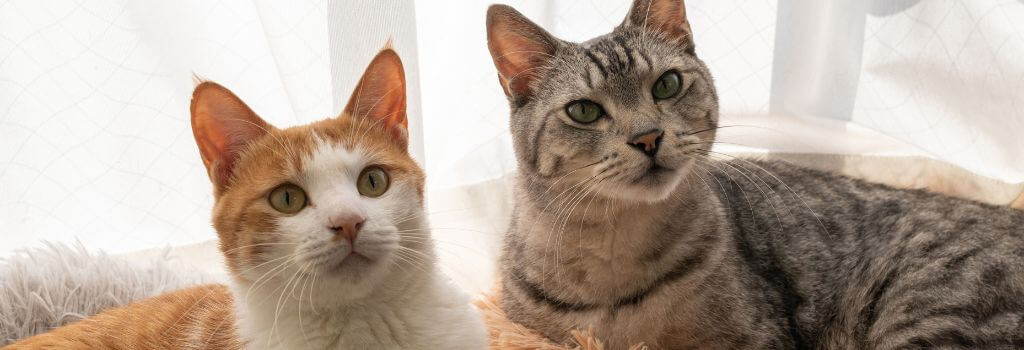Many cat parents wonder if their feline companion would benefit from having another cat in the household. While some cats thrive with furry siblings, others prefer to remain the sole ruler of their domain. So, how do you know if your feline friend needs a buddy of their own?
As veterinarians, we often hear from concerned pet parents who worry their cat might be lonely, especially when left alone during long workdays. The truth is, cats have distinct personalities, just like humans. Some are social butterflies who crave constant companionship, while others prefer solitary living. Here are a few things to consider if you’re thinking about getting a companion for your cat.
Signs Your Cat Might Want a Companion
While every cat is different, certain signs could indicate they’d benefit from having a companion.
Signs your cat might like a friend include:
- Excessive clinginess or following you around constantly
- Destructive behavior when left alone
- Overgrooming or other signs of anxiety
- Seeking attention at inconvenient times, especially late at night
- Playing roughly with you, using teeth and claws
- Seeming depressed or lethargic when alone
When Adding a Second Cat Makes Sense
Multiple-cat households flourish under the right circumstances. If your cat has previously shared their home with feline companions, they’re more likely to welcome a new friend. Pay attention to how they react when they spot other cats through the windows. Cats who show friendly interest rather than aggression might be good candidates for companionship.

Age plays a significant role in adaptability, too, with younger cats under two years old typically being more accepting of newcomers. Your cat’s general temperament offers important clues, as well. Those with playful, easy-going personalities tend to be more open to sharing their space. Of course, your living situation matters, too. Having enough room for each cat to establish their own territory helps prevent tension and allows for harmonious coexistence.
Signs Your Cat Might Prefer Flying Solo
Not every cat needs or wants feline companionship, and some cats thrive as the only pet in their household. Watch for behaviors that might indicate your cat prefers solitude. If your cat hides or displays aggressive behavior at the sight of other cats, they’re communicating their preference for personal space. A history of confrontations with neighborhood cats also indicates that your feline friend isn’t interested in sharing their territory.
Some cats are distressed by even minor changes in their daily routine. If your kitty doesn’t like change, adding another cat to your family will likely cause unnecessary stress. Plus, senior cats who have lived as only pets often prefer maintaining their solitary lifestyle rather than adapting to a new companion.
Territorial behaviors, such as spraying, indicate your cat feels strongly about protecting their space. Health considerations matter, too. Cats with certain medical conditions might find the stress of a new feline housemate overwhelming, potentially worsening their condition. And if your cat has a communicable disease, like FIV or FeLV, they could infect their new sibling if you bring another furry friend home.
You’re Already Your Cat’s Best Friend
No matter how many cats you have, you are their most important family member. Many cats form their strongest bonds with their human family members. In other words, you’re already your cat’s best friend!
If your cat seems content but occasionally lonely, consider:
- Establishing regular play sessions (aim for 10-15 minutes, 2-3 times daily)
- Creating an enriching environment with climbing spaces, window perches, and hiding spots
- Providing interactive toys for mental stimulation when you’re away
- Setting up bird-watching stations near windows
- Spending quality time together through grooming and gentle petting
- Talking to your cat throughout the day. They recognize and respond to your voice.

Tips for Success When Introducing Another Cat
If you decide to add another cat to your family, proper introduction is crucial for long-term harmony. The process begins with selecting a compatible companion. Take the time to find a cat whose age, energy level, and personality complement your existing pet.
Before bringing your new arrival home, establish separate living spaces where each cat can feel secure. A separation period is essential for both cats to adjust to each other’s presence. The initial phase focuses on scent familiarization, letting each cat become accustomed to the other’s smell without the stress of face-to-face encounters.
Once both cats show signs of comfort, begin introducing them through supervised interactions, always watching for signs of stress or aggression. Throughout this process, provide essentials for each cat, including separate litter boxes, food and water bowls, comfortable beds, and scratching posts, to prevent resource guarding.
Most importantly, remember that patience is vital. While some cats become friends within days, others may need weeks or even months to fully accept their new family member. Following these steps helps create a foundation for a peaceful shared home.
The Importance of Space and Resources
Whether you have one cat or multiple, proper resources are essential.
Each cat needs:
- Their own litter box (plus one extra. In other words, if you have two cats, you need three litter boxes)
- Multiple feeding stations
- Several water sources throughout your home
- Individual scratching posts, beds, and resting areas
- Vertical space for climbing and observation
- Quiet retreat spaces for alone time
Health Considerations
Adding a new cat requires careful health planning.
All cats in the household should be:
- Current on vaccinations
- Tested for FeLV/FIV
- Free from parasites
- Spayed or neutered
- Given regular preventive care
Making an Informed Decision
If you’re thinking about getting your cat a friend, base your decision on your current cat’s personality, your living situation, and your ability to provide proper care for multiple pets. Pay close attention to your feline friend’s behavior and consider how they’ve interacted with other cats in the past.
When given adequate attention and enrichment, cats can live perfectly happy lives as single pets. The most important thing is understanding your cat’s needs and preferences.
If your cat is showing signs they might benefit from a feline friend, your veterinarian is an excellent resource. Schedule an appointment to discuss your veterinarian about your cat’s personality and whether adding another cat to your household would be beneficial. They can evaluate your current cat’s temperament and provide personalized advice for your situation. Reach out today to explore what’s best for your feline family member!
If you have questions and you'd like to reach out to us, you can call us directly at (303) 625-9266, or you can email us at [email protected]. Don't forget to follow us on social media https://www.facebook.com/7HillsVet/" target="_blank">Facebook, Instagram.
